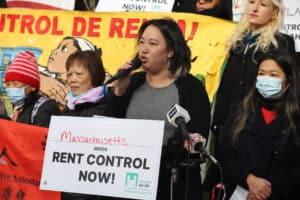
Carolyn Chou, director of Homes for All Massachusetts, speaks at a rally in support of rent control legislation outside of the State House on Tuesday, Nov. 14, 2023. Photo by Sam Drysdale | State House News Service
Against the backdrop of what elected officials on both sides of the aisle have called a “housing crisis” in Massachusetts, advocates took to Beacon Hill on Tuesday to try to convince lawmakers to advance a policy to limit rent hikes, while real estate industry leaders decried the idea as counterproductive.
There seems to be little appetite on Beacon Hill to revisit the idea of rent control, and lawmakers scheduled their hearing on the topic to coincide with a flurry of other legislative activity. The state legislature is also about to embark on a seven-week holiday recess without holding a hearing on Gov. Maura Healey’s “urgent” $4.12 billion housing bond bill, which excluded rent control but laid out a string of other ideas.
But advocates who gathered Tuesday in support of multiple bills that would revive local option rent control, nearly 30 years after voters banned it, said that it is an essential tool to address the housing affordability crisis that has forced tenants out of their homes.
Bills Under Consideration
Legislation filed by Rep. Mike Connolly and Sen. Jamie Eldridge’s (H.1304 / S.872) would allow cities and towns to prohibit landlords from raising rent over a predetermined percentage each year. Some housing advocates Tuesday recalled instances where their rents rose as high as 60 percent in a single year.
“The rent has gone up,” said Athol resident Denise Crowl, who lives in a senior living community. “I live on Social Security. I’m by myself, I’m a widow. And I love my home and I love the people, but I struggle from month to month on whether to pay my rent or buy groceries and there’s times when I can’t afford both.”
Athol town government filed a home rule petition this year to allow the town to regulate rent in manufactured housing parks, such as Crowl’s community. Municipalities cannot implement rent control without approval from the state – and voters decided to ban the policy statewide in 1994. Connolly and Eldridge’s bill, as well as a bill filed by Sen. Pat Jehlen, Sen. Adam Gomez, Rep. Dave Rogers and Rep. Sam Montaño (S.1299 / H.2103), seeks to give the power to regulate local rents back to cities and towns.
Leila Peralta, a mother who lives in Lawrence, said at Tuesday’s rally that her rent recently increased by $700 per month – 50 percent.
“We are fighting with a landlord who is completely insensitive to the pains of the working class,” she said through a translator.
Connolly and some rent control supporters had been eyeing an initiative petition, as a way to put a new law on the books without the legislature’s help, but their campaign to put the rent control question before voters dissolved last week.
Real Estate Plays Defense
Opponents with real estate interests argue that rent control inhibits housing production, discourages landlords from maintaining higher quality apartments, and drives down property tax revenue.
“Rent control reduces the supply of housing which drives rents up,” said Amir Shahsavari, vice president of the Small Property Owners Association. “It makes it more difficult for owners to keep up with rising operating costs, it leads to disrepair, and it makes it nearly impossible to remove non-complying tenants, not only to the detriment of owners and their properties, but also to the detriment of the other tenants who depend on us to provide them with safe, maintained living spaces.”
Greg Vasil, CEO of the Greater Boston Real Estate Board and a vocal opponent of rent control, said the state should prioritize housing creation, rather than “failed policies such as rent control.”
“Artificial caps on rent discourage the creation of new apartments and the upkeep and maintenance of existing ones, shrinking our housing stock further and driving up costs throughout the region,” Vasil said. “Instead, the state must continue to work toward eliminating barriers to housing creation, building upon policies such as the MBTA Communities Law aimed at creating multi-family homes across the Commonwealth.”
Backers: It’s a ‘Moral Issue’
Responding to the common argument that rent control discourages the creation of new housing, Montaño – who filed a home rule petition on behalf of Boston city government to regulate rent in the capital – said at a rally Tuesday that this was a “moral issue.”
“This is not an issue about the market,” Montaño said. “This is not an issue about how we use capitalism. This is an issue about morals. Morally, we need to house people. That’s it. Doesn’t matter. People need homes, they need a warm place to sleep, they need a place to shower, they need a place to feel safe. And we are failing at providing that for people by allowing landlords to try to charge huge increases year to year and constantly displacing people.”
Boston’s home rule petition, (H.3744) championed by Mayor Michelle Wu, garnered attention in March when the city council voted 11-2 to advance the policy to the legislature for approval.
Wu’s “rent stabilization” policy calls for setting the annual allowable rent increase at either 10 percent or at the Consumer Price Index for Boston plus 6 percent, whichever is lower.
In the spring, the mayor told councilors that advertised rents across Boston increased 14 percent in 2022, and prices jumped more than 20 percent in some neighborhoods.
“Today, the City Council delivered a strong message that the city of Boston needs the tools to address our housing crisis,” Wu said after the City Council vote. “We hear from residents across every single neighborhood just how dire it is, and we see families who are getting pushed out of the communities they grew up in and helped build. This is affecting everything from how our businesses and economy can recover to our school enrollment and the stability of every part of our neighborhoods.”
Wu Conspicuously Absent
But on Tuesday, with her rent control bill before the committee that would decide its fate, the mayor did not testify before lawmakers.
Wu was at a YMCA event announcing investments in early education during the hearing, according to her spokesperson Ricardo Pátron.
Sheila Dillon, the mayor’s chief of housing, called the petition a “very, very important piece of legislation.”
“The rising cost of housing in Boston is our number one issue, and it has been for many years,” Dillon said. “We are now seeing eviction filings and executions near pre-pandemic levels, which is very very disturbing. Every single day, my office receives calls from seniors and families that their buildings have been sold and new owners are raising rents or just asking them, flat out, to leave.”
In Wu’s written testimony, she expressed “strong support” for the bill. She said the rising cost of housing deepened racial and socioeconomic disparities in the city, with 58 percent of tenants of color considered “housing cost burdened,” compared to 38 percent of white renters.
Restricting how much landlords can raise rent year-over-year would, she said, “allow tenants to have reasonable expectations of the increases in their living expenses and allow them to plan accordingly.”
She estimated that only 55 percent of rental properties would be subject to rent stabilization, due to carve-outs for smaller owner-occupied properties and new developments. She said the policy is “one piece of a much broader strategy to address the housing crisis,” which also includes building more affordable homes.







